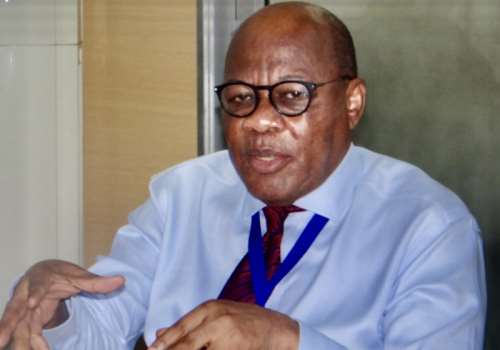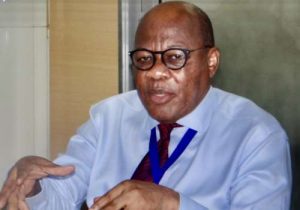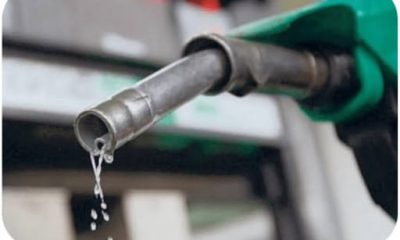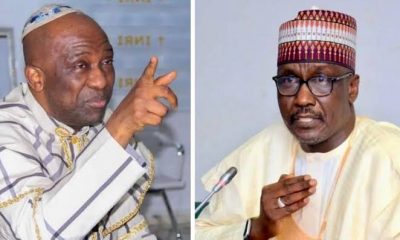Business
Correcting the Lies in Dr. Olisa Agbakoba’s Assertions By Kingsley Ariamaodo

Correcting the Lies in Dr. Olisa Agbakoba’s Assertions
By Kingsley Ariamaodo
Eminent lawyer and Senior Advocate of Nigeria, Dr. Olisa Agbakoba, has lately been calling for the repeal of the Petroleum Industry Act 2021 which is within his rights as a citizen. But in doing so, he has been making some assertions regarding the status and operations of the NNPC Ltd that are not quite true.
This is not an attempt to join issues with him. It is just to set the records straight, knowing that when falsehood is left unchallenged, it is accepted as the truth.
One of the key reasons he claims to be calling for the repeal of the PIA is that under it, NNPC Ltd is playing the roles of an operator and a regulator. When pressed to be specific on the regulatory roles being performed by the NNPC Ltd, he listed “fixing prices of petroleum products” and “acting as sole importer of petroleum products”.
The truth, however, is that the PIA does not have any provision that makes NNPC Ltd a regulator in the oil and gas industry. The PIA specifically provides for the establishment of two regulators in the industry. They are: The Nigerian Upstream Petroleum Regulatory Commission (NUPRC), and the Nigerian Midstream and Downstream Petroleum Regulatory Authority (NMDPRA).
One of the objectives of the reforms that the PIA was designed to bring about was the scrapping of the dual roles of operator and regulator played by the NNPC as a government Corporation. Since the PIA came into force in 2021 and the consequent transition of NNPC into a limited liability company that operates under the Companies and Allied Matters Act in 2022, the Company has ceased to take on any regulatory role in strict compliance with the law.
Contrary to the learned Senior Advocate’s claim that NNPC Ltd fixes prices of petroleum products, the Company does not fix prices. In fact, no agency or entity unilaterally fixes prices of petroleum product as the PIA in Sections 205, 206 and 207 provides for a deregulated market which is currently in operation in the Downstream Sector. Under the deregulated market, every marketer is allowed to determine the price of its products as it deems fit, taking market forces into consideration. Based on this principle, NNPC Ltd through its Downstream subsidiary,
NNPC Retail Ltd, fixes the prices of its products. It does not fix prices for the entire market as other marketers are at liberty to set their own prices based on market realities. This is the reason NNPC Retail stations in Abuja sell Premium Motor Spirit (PMS) at N617 per litre while other marketers sell at various prices. Similar conditions prevail across the country with different marketers selling petroleum products at different prices. If the sector was still regulated, it would be the duty of the NMDPRA to fix prices and not NNPC Ltd as a player in the industry.
On the claim that NNPC Ltd is the sole importer of petroleum products, this is also not true. Other marketers import AGO and ATK (diesel and aviation fuel). The reason they are not able to engage in the importation of PMS has to do with foreign exchange issues. But the PIA, apparently envisaging situations like this, provides that NNPC Ltd should serve as a supplier of last resort to guarantee energy security. This is very explicit in Section 64 of the PIA. That is the reason NNPC Ltd is currently the sole importer of PMS (not all petroleum products), and that does not in any way make it a regulator.
NNPC Ltd has since moved on to assume its statutory role as a commercial operator in the entire value chain of the energy industry. It has further sealed its status as a commercial operator with declaration of ₦2.52 trillion and ₦674 billion profit after tax in 2021 and 2022 respectively.
We believe that even if other members of the public, out of ignorance, still see NNPC Ltd as a regulator based on its previous operations pre-PIA, it should not be a learned silk like Dr. Agbakoba who should be familiar with the law.
Mr. Ariamaodo, writes in from Abuja.
Business
Nigeria’s Inflation Drops to 15.10% as NBS Reports Deflationary Trend

Nigeria’s headline inflation rate declined to 15.10 per cent in January 2026, marking a significant drop from 27.61 per cent recorded in January 2025, according to the latest Consumer Price Index (CPI) report released by the National Bureau of Statistics.
The report also showed that month-on-month inflation recorded a deflationary trend of –2.88 per cent, representing a 3.42 percentage-point decrease compared to December 2025. Analysts say the development signals easing price pressures across key sectors of the economy.
Food inflation stood at 8.89 per cent year-on-year, down from 29.63 per cent in January 2025. On a month-on-month basis, food prices declined by 6.02 per cent, reflecting lower costs in several staple commodities.
The data suggests a sustained downward trajectory in inflation over the past 12 months, pointing to improving macroeconomic stability.
The administration of President Bola Ahmed Tinubu has consistently attributed recent economic adjustments to ongoing fiscal and monetary reforms aimed at stabilising prices, boosting agricultural output, and strengthening domestic supply chains.
Economic analysts note that while the latest figures indicate progress, sustaining the downward trend will depend on continued policy discipline, exchange rate stability, and improvements in food production and distribution.
The January report provides one of the clearest indications yet that inflationary pressures, which surged in early 2025, may be moderating.
Bank
Alpha Morgan to Host 19th Economic Review Webinar

Alpha Morgan to Host 19th Economic Review Webinar
In an economy shaped by constant shifts, the edge often belongs to those with the right information.
On Wednesday, February 25, 2026, Alpha Morgan Bank will host the 19th edition of its Economic Review Webinar, a high-level thought leadership session designed to equip businesses, investors, and individuals with timely financial and economic insight.
The session, which will hold live on Zoom at 10:00am WAT and will feature economist Bismarck Rewane, who will examine the key signals influencing Nigeria’s economic direction in 2026, including policy trends, market movements, and global developments shaping the local landscape.
With a consistent track record of delivering clarity in uncertain times, the Alpha Morgan Economic Review continues to provide practical context for decision-making in a dynamic environment.
Registration for the 19th Alpha Morgan Economic Review is free and can be completed via https://bit.ly/registeramerseries19
It is a bi-monthly platform that is open to the public and is held virtually.
Visit www.alphamorganbank to know more.
Business
GTBank Launches Quick Airtime Loan at 2.95%

GTBank Launches Quick Airtime Loan at 2.95%
Guaranty Trust Bank Ltd (GTBank), the flagship banking franchise of GTCO Plc, Africa’s leading financial services group, today announced the launch of Quick Airtime Loan, an innovative digital solution that gives customers instant access to airtime when they run out of call credit and have limited funds in their bank accounts, ensuring customers can stay connected when it matters most.
In today’s always-on world, running out of airtime is more than a minor inconvenience. It can mean missed opportunities, disrupted plans, and lost connections, often at the very moment when funds are tight, and options are limited. Quick Airtime Loan was created to solve this problem, offering customers instant access to airtime on credit, directly from their bank. With Quick Airtime Loan, eligible GTBank customers can access from ₦100 and up to ₦10,000 by dialing *737*90#. Available across all major mobile networks in Nigeria, the service will soon expand to include data loans, further strengthening its proposition as a reliable on-demand platform.
For years, the airtime credit market has been dominated by Telcos, where charges for this service are at 15%. GTBank is now changing the narrative by offering a customer-centric, bank-led digital alternative priced at 2.95%. Built on transparency, convenience and affordability, Quick Airtime Loan has the potential to broaden access to airtime, deliver meaningful cost savings for millions of Nigerians, and redefine how financial services show up in everyday life, not just in banking moments.
Commenting on the product launch, Miriam Olusanya, Managing Director of Guaranty Trust Bank Ltd, said: “Quick Airtime Loan reflects GTBank’s continued focus on delivering digital solutions that are relevant, accessible, and built around real customer needs. The solution underscores the power of a connected financial ecosystem, combining GTBank’s digital reach and lending expertise with the capabilities of HabariPay to deliver a smooth, end-to-end experience. By leveraging unique strengths across the Group, we are able to accelerate innovation, strengthen execution, and deliver a more integrated customer experience across all our service channels.”
Importantly, Quick Airtime Loan highlights GTCO’s evolution as a fully diversified financial services group. Leveraging HabariPay’s Squad, the solution reinforces the Group’s ecosystem proposition by bringing together banking, payment technology, and digital channels to deliver intuitive, one-stop experiences for customers.
With this new product launch, Guaranty Trust Bank is extending its legacy of pioneering digital-first solutions that have redefined customer access to financial services across the industry, building on the proven strength of its widely adopted QuickCredit offering and the convenience of the Bank’s iconic *737# USSD Banking platform.
About Guaranty Trust Bank
Guaranty Trust Bank (GTBank) is the flagship banking franchise of GTCO Plc, a leading financial services group with a strong presence across Africa and the United Kingdom. The Bank is widely recognized for its leadership in digital banking, customer experience, and innovative financial solutions that deliver value to individuals, businesses, and communities.
About HabariPay
HabariPay is the payments fintech subsidiary of GTCO Plc, focused on enabling fast, secure, and accessible digital payments for individuals and businesses. By integrating payments and digital technology, HabariPay supports innovative services that make everyday financial interactions simpler and more seamless.
Enquiries:
GTCO
Group Corporate Communication
[email protected]
+234-1-2715227
www.gtcoplc.com
-

 celebrity radar - gossips6 months ago
celebrity radar - gossips6 months agoWhy Babangida’s Hilltop Home Became Nigeria’s Political “Mecca”
-

 society6 months ago
society6 months agoPower is a Loan, Not a Possession: The Sacred Duty of Planting People
-

 society5 months ago
society5 months agoReligion: Africa’s Oldest Weapon of Enslavement and the Forgotten Truth
-

 news6 months ago
news6 months agoTHE APPOINTMENT OF WASIU AYINDE BY THE FEDERAL GOVERNMENT AS AN AMBASSADOR SOUNDS EMBARRASSING










